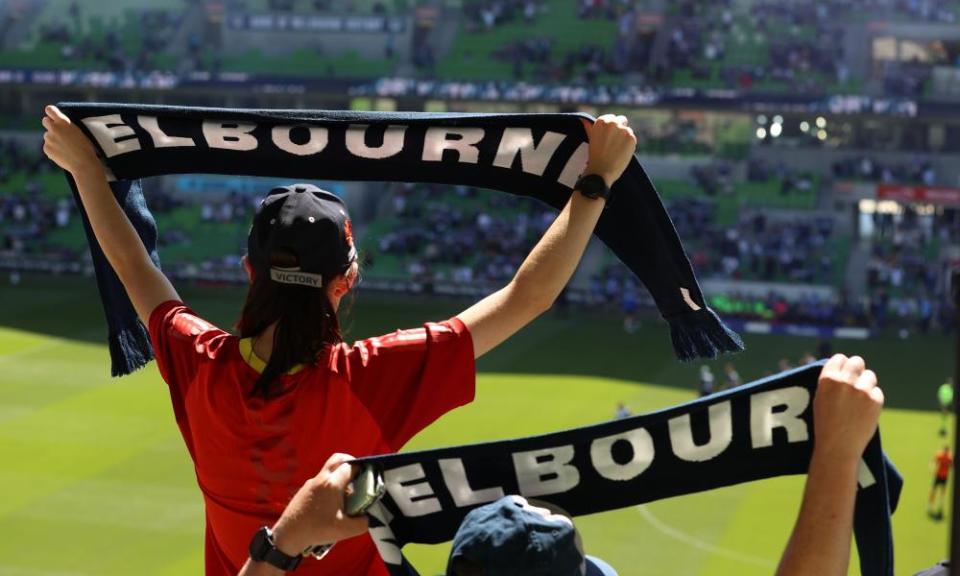Melbourne falls short in Women’s World Cup venue allocation

An inability to provide access to stadia that meets Fifa requirements of capacity and availability has cost Melbourne its chance to host major knockout fixtures of the 2023 Women’s World Cup, and there are no guarantees that the situation will be different should further major football events head to Australia.
With 595 days to go before the start of the competition, Fifa on Thursday announced the full match schedule, with games to be staged in nine different cities and at 10 separate venues across Australia and New Zealand.
Related: Sydney to host 2023 Women’s World Cup final as schedule revealed
Sydney will host 11 matches in total – including the final, a semi-final and the Matildas’ opening game – with Auckland and Wellington hosting nine each. Brisbane has been scheduled for eight games, while Melbourne has been booked to host just six games in total, equal with Dunedin. Perth, Adelaide and Hamilton will also play host to games at the showpiece event.
Although AAMI Park will host the Matildas’ third group game, Melbourne had previously been positioned to host a quarter-final. The Victorian capital will now make do with two last-16 matches.
For an outpost that styles itself as the “sporting capital of the world” and takes pride in its ability to support women’s sport – 86,174 fans attended the 2020 Women’s T20 World Cup final at the MCG – that four other cities across Australia and New Zealand will host more games of what is rapidly becoming one of the biggest sporting events on the planet is, at a first glance, perplexing.
Further, beyond its bombastic rhetoric, Victoria is home to the second most registered football participants across Australia - Football Victoria reported 456,604 total participants in 2020 and a more than 50% growth in registered girls and women playing the sport in 2020.
However, although conspiracy theories surface whenever Fifa or Sydney-based Football Australia is involved, the reasoning for the allocation is a relatively simple one: a matter of stadium availability and the AFL – the local heavyweight code – flexing its muscle.
Securing large-capacity, marquee venues such as Marvel Stadium and the MCG for singular, one-off matchdays would have been a relatively simple proposition for organisers. But the exclusivity periods that Fifa demands of World Cup stadia – two weeks before the first game at the venue and at least a week after the last – would have effectively locked out the AFL, the owners of Marvel Stadium and a key tenant of the MCG, from those venues for an extended period during its 2023 season.
Coming off the back of two heavily disrupted years, the prospect of losing one or both of its key venues during the 2023 season presented an anathema to the AFL and required significant compensation. Football Australia, with little appetite for protracted negotiations or using revenue from the tournament to compensate a rival code, quickly set their sights on securing venues in Brisbane, Sydney and Auckland rather than battle for a deal with the Victorian sporting powerbroker.
Football and the AFL, as well as a host of other sports, are also engaged in a fierce battle for hearts, minds, participation and revenue from the rapidly growing interest in women’s and girl’s sport, with the AFLW planning to expand to a full 18-team competition in 2023.
As a result, the 30,000-seat AAMI Park became the only viable venue in Melbourne, a ground too small for the tournament’s major games as per rules set by Fifa – who are the ultimate arbiters of venue selection at World Cups.
“The Fifa Women’s World Cup Australia and New Zealand 2023 will be held from 20 July to 20 August in 2023,” a Football Australia spokesperson said. “This period presented challenges in the availability of venues and for the duration these venues were required as part of Fifa’s requirements. We worked closely with state governments to ensure that the best possible venues were selected and available in accordance with the venue requirements for the tournament.”
Melbourne will at least host some fixtures in 2023 and Football Australia has signalled an intention to bring both Matildas and Socceroos events to the city in the near future, but the precarious situation could come back to haunt Victoria should further major sporting events come to Australia.
While the actual prognosis of an Australian bid for the 2034 Men’s World Cup is a matter of debate – China, despite not formally signalling an intent to host, is seen as a prohibitive favourite to host the next time the tournament returns to Asia – the line between staging a successful Women’s World Cup in 2023, Brisbane Olympics in 2032, and another World Cup in 2034 is an obvious one. The prospect has been raised as a matter worthy of exploration at Football Australia.
However, Fifa’s guide to the bidding process for the 2026 World Cup – the first iteration of the tournament in which 48 teams will take part – dictates that every match be played at a venue with a minimum 40,000 net seating capacity; 80,000 is required for the opening match and the final and at least 60,000 for a semi-final.
The issue of the AFL releasing Marvel Stadium or the MCG was a matter of significant consternation during Australia’s ultimately disastrous and misguided attempt to secure the 2022 World Cup – which ended up with the bid receiving just a single vote – and Football Australia would have to negotiate with the AFL for Melbourne to host any matches at all at that tournament.

 Yahoo Finance
Yahoo Finance 